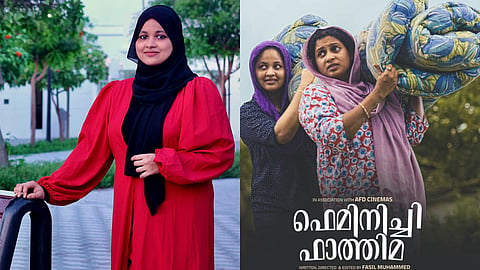

When Shamla Hamza first heard the story of Feminichi Fathima, she felt an instant sense of familiarity. It wasn’t just about a woman and her stubborn husband, but about the quiet endurance of countless women whose lives are shaped by compromise. A story that hides its anger in humour and its rebellion in something as ordinary as a mattress. “I felt very close to this character because it’s a story that needs to be told,” she says assuredly. “What our mothers and grandmothers faced was far worse than what we go through today. At least now we have the voice to say no to unhealthy relationships or toxic work culture.”
Written, directed and edited by debutant Fasil Muhammed, Feminichi Fathima finally reached theatres in Kerala on October 10, after a festival journey as inspiring as its heroine. Distributed by Dulquer Salmaan’s Wayfarer Films, this sharp yet endearing satire taking on patriarchy travelled far beyond the lanes of Ponnani, where its tender yet rebellious story takes shape. First celebrated at the 29th International Film Festival of Kerala (IFFK) in 2024, the film charmed audiences with its blend of humour and subtle resistance. At its heart is Fathima, played brilliantly by Shamla, a homemaker whose simple wish to buy a mattress becomes an unexpectedly moving statement of agency and dignity.
For Shamla, who had acted only once before, in another IFFK favourite 1001 Nunakal, the role of Fathima felt both like a challenge and a homecoming. “Fasil (Muhammed) had been the spot editor for 1001 Nunakal. When he, the film’s director Thamar (KV) and my co-actor Sudheesh Scaria decided to make Feminichi Fathima together, they told me I was their first choice,” she recalls. “I was thrilled because the story wasn’t loud or preachy. It spoke about real people, in real homes.”
Shamla joined the project when her daughter was barely six months old. “I was very much a mother then,” she smiles. “Always tired, a little overweight, constantly thinking about my baby who was with me on set. I didn’t go through any workshops or formal training. I just listened to Fasil before each scene and tried to do justice to what he wanted.”
During our conversation, Shamla pauses often to attend to her crying toddler in the background. Between gentle instructions for her daughter to “practice ABCD,” one can sense the quiet strength that mirrors the woman she plays on screen. The Ponnani dialect of Fathima, too, came to Shamla effortlessly. Born and raised in Thrithala, with relatives in Ponnani and Edappal, she was already fluent in the language of the film’s world. “The dialect was very close to how we speak at home,” she says. “It helped me stay grounded in the role.”
Her performance carries that same sense of familiarity, which is rooted, unpolished and deeply human. Fathima is no fiery revolutionary. She simply wants to be heard, and in many ways, her story mirrors the quiet struggles of countless women who yearn for self-reliance. Speaking about the idea of financial independence, Shamla reflects, “It’s not about rejecting support,” she says, adding, “It’s about having the freedom to make your own choices. Depending completely on someone else's income can take away your confidence. Financial independence, which I believe is important for women, isn’t just about money, it’s about having a sense of purpose.”
Feminichi Fathima uses humour to reveal the absurdity of control within domestic life. For Shamla, that tone was crucial. “We didn’t want the film to feel heavy or moralising,” she says. “Fasil knew exactly where to stop so it stayed funny but still meaningful.” Some of its most delightful moments, she adds, came from improvisation. “There’s one scene where Soora’s daughter goes out with a boy on a bike. I told Viji chechi (Viji Viswanath), who played Soora, that Fathima could teasingly ask Sooratha about it, and Sooratha could act confused. Fasil said, ‘Let’s try it,’ and it ended up getting a huge laugh in the theatre.”
Looking back, Shamla still speaks of the film’s first IFFK screening with disbelief. “We never expected it to be selected in the International Competition section in the first place. All we wanted was at least a normal screening so it reaches audiences. After the show, people hugged us and shared their stories. It was beautiful to see how everyone, from students to older women, found a piece of themselves in Fathima.” Some responses, she says, were especially moving. “Several men told us they had behaved like Ashraf (Fathima's husband) and that they had realised how wrong it was. That’s when I understood the film was already starting to make a difference.”
Shamla’s path to cinema has been anything but direct. About a decade ago, she appeared on the reality show Midukki, which offered a small glimpse into the entertainment world. “Later, I started writing lyrics for songs, hoping it would lead me to films. When nothing worked, I released them on YouTube,” she recalls. Her acting break came unexpectedly with 1001 Nunakal. “I even wrote a song for its audition,” she laughs. “They didn’t need it, but it probably showed my determination. Once I started acting, I realised how much I love it.”
Now based in Dubai, Shamla balances family life with creative ambitions. “I quit my job after my daughter was born,” she says. “Now I just want to focus on doing good films and good roles. Maybe a police officer someday. Or even a serial killer,” she grins. Her inspirations include Urvashi, Indrans, Salim Kumar, Manju Warrier, Parvathy Thiruvothu, etc. “Urvashi chechi has been my all-time favourite,” she says. “She can make you laugh and cry in the same breath.”